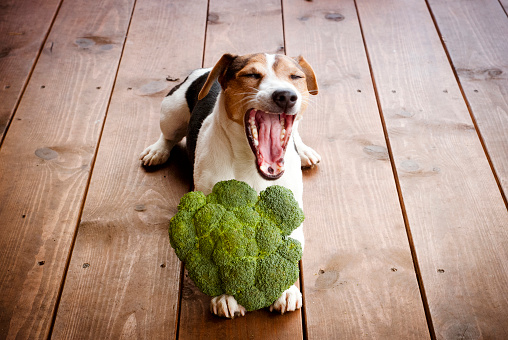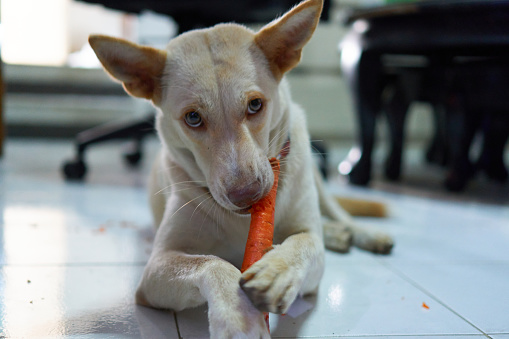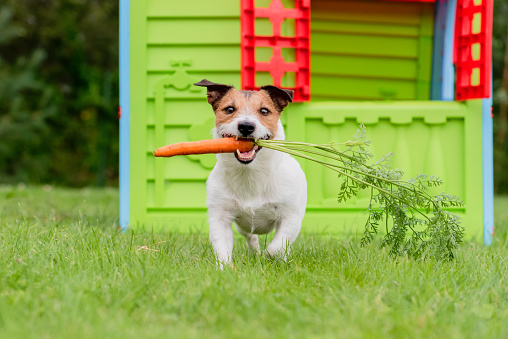As veganism becomes more and more popular, some pet parents who have experienced the health benefits of an animal-free diet wonder if their dog can similarly benefit. Plenty of controversies have surrounded the idea of a vegan dog, so sometimes it’s hard to know what to believe. Let’s discuss if you can have a healthy vegan dog.

What Is Veganism?
Before discussing having a vegan dog, we must first understand veganism. Veganism is the practice of abstaining from the use, especially the ingestion, of any animal products or animal byproducts. Someone who practices veganism is known as a vegan.
Veganism Vs. Vegetarianism
Though the terms vegan and vegetarian are often used interchangeably and have many similarities, they are different at their core. Where vegans and vegetarians might both steer clear of meat, vegetarians will incorporate animal byproducts like eggs, milk, and honey into their diet.
Dogs and Their Diet
Though dogs’ ancestors, wolves, are carnivores, as dogs evolved alongside humans, they gained the ability to eat more of the things we do; dogs became omnivores, eating both meat and plants. 15,000 years ago, give or take a century, humans began domesticating dogs. Dogs adopted what we call an adaptive metabolism.
In other words, as dogs spent more time with humans, they adapted their diet to eat more of the foods their omnivore humans had on hand. Sometimes this meant meat, and other times the human and dog duos were consuming plants in the forms of fruits and vegetables.

How Do We Know Dogs Are Omnivores?
There are several indicators that modern-day dogs are omnivores:
- Dogs have digestive enzymes in their pancreas essential to breaking down starches. They would not need these enzymes if they were strict carnivores.
- Dogs can convert fatty acids in plants into usable compounds in their bodies. Carnivores, like cats, cannot do this.
- Most true carnivores have sharp teeth to rip meat apart. While dogs also have sharp canines, they also have broad, flat molars towards the back of their mouth for grinding and crushing plant foods.
Can I Have a Vegan Dog?
So we’ve shown that dogs are omnivores capable of eating both meat and plants, but can you have a vegan dog? The answer is yes and no. Could you keep your dog alive by feeding them nothing but plant-based foods and avoiding animal products or by-products? Yes.
However, it is difficult to maintain a properly balanced diet for a vegan dog. The resulting imbalance diet can detrimentally affect your puppy in the long run. If you are set on having a vegan dog, consult with a licensed veterinarian to create a diet with supplements and a schedule to keep your dog happy and healthy. Your veterinarian will consider your dog’s specific needs and existing health conditions. Not every dog can safely be a vegan dog.
Homemade Vegan Dog Food
With your help, you can formulate your own homemade vegan dog food. Pet owners should make sure that at least ⅓ of their dog’s diet is protein. Protein does not equal meat. Several protein options are available. Many pet owners choose pinto beans as the protein base of their meals. Cook the beans until they are soft and mash them into a paste.
The other ⅔ of your dog’s diet should consist of dog-safe raw or cooked vegetables, whole grains, and any essential supplements.

Other Vegan Foods That Dogs Can Eat
Here are some dog-safe vegan food items:
- Quinoa
- Carrots
- Broccoli
- Rice
- Dark, leafy greens
- Lentils
- Watermelon
- Strawberries
- Blueberries
- Bananas
- Apples
Myths About Vegan Dogs
Here are a few debunked myths about vegan dogs.
Veterinarians don’t like vegan diets for dogs.
All veterinarians are humans, humans with opinions. However, these opinions are usually backed by medical studies and their own experiences in their practices. While some vets might not agree with a vegan dog, that doesn’t mean veganism is inherently flawed. Open up a dialogue with your dog’s vet and listen to their thoughts on your dog’s health issues, weight, preexisting conditions, etc., to understand why your vet feels the way they do about a vegan dog diet.
A vegan dog isn’t a healthy dog.
Vegan dogs can be just as healthy as meat-eating ones, so long as their nutrient intake is appropriate for their individual needs. Just as feeding a meat-only diet doesn’t ensure a healthy dog, neither does feeding a vegan diet. Great care must be taken to ensure we meet our dog’s needs.
A vegan dog is animal cruelty.
Veganism is no animal cruelty. Many dog owners adopt a vegan lifestyle due to cultural or religious reasons. Even if it’s just a preference, individuals are entitled to their thoughts and feelings regarding what food they put in their bodies and purchase to feed their dogs. There is nothing wrong with a vegan dog.
Potential Issues For a Vegan Dog
Deficiencies in your dog’s diet can cause irreversible health effects. Issues in your dog’s diet can lead to severe medical issues. Here are a few problems that can arise for a vegan dog.
Inadequate total protein intake.
Dogs who receive less than 25 grams of protein for every 1,000 calories are not getting enough protein. This issue is usually the most common one with homemade vegan dog diets.
Vitamin deficiency.
Nutrients such as B vitamins, phosphorous, iron, and calcium are typically obtained through meat or other animal products. As a result, it’s common for vegan dogs not to get enough of these nutrients.
Imbalances of amino or fatty acids.
Taurine and L-carnitine are two amino acids found in meat. Vegan diets are often deficient in dogs’ essential amino acids and fatty acids. Taurine deficiencies cause dilated cardiomyopathy, where a dog’s heart becomes enlarged and suffers weak contractions.

A Vegan Dog Can Be a Healthy Dog
A vegan diet is possible for a healthy dog. As long as you consult with licensed veterinarians and canine dietary specialists, it is possible to curate a healthy, balanced diet for your dog that does not include any animal products. As long as you take the time to ensure your dog gets all the essential nutrients they need, you can have a healthy, happy, thriving vegan dog.
You may also like:
